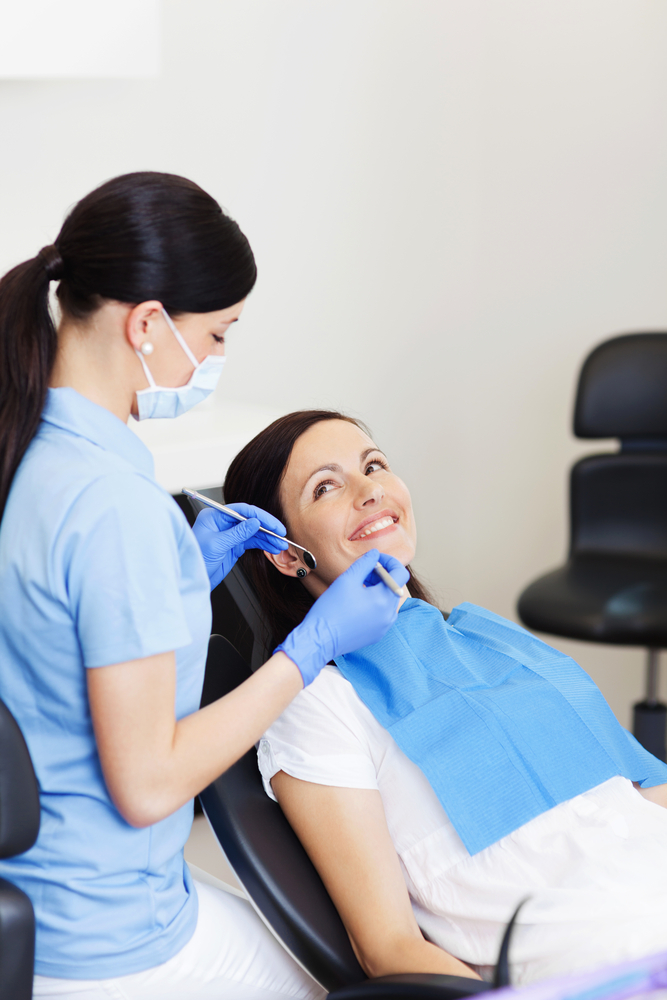Preventative
Dentistry
Oral Cancer Screening in Pembroke, ON
Take Charge of Your Oral Health with Routine Preventive Screenings
Oral cancer poses a significant threat, despite being up to 90 percent curable. This underscores the critical importance of early detection.
At Parkview Dental, we integrate oral cancer screenings seamlessly into your routine checkups. Dr. James Munro recommends annual screenings but can conduct them during your biannual appointments as well. To schedule your screening, call (613) 735-2336.
What is Oral Cancer?
Oral cancer refers to the abnormal growth of cells in the mouth, including the lips, tongue, gums, teeth, inner lining of the cheeks, roof, and floor of the mouth. If left untreated, it can spread to other parts of the body.
Signs of Oral Cancer

- Persistent Sores or Ulcers: Any sores or ulcers in the mouth that don’t heal within a few weeks.
- Red or White Patches: Unusual patches or spots in the mouth that are red or white.
- Lumps or Thickened Tissues: Development of lumps or thickened areas in the mouth, gums, or on the lips.
- Difficulty Swallowing or Speaking: Persistent difficulty in swallowing, speaking, or moving the jaw.
- Unexplained Bleeding: Unexplained bleeding in the mouth or throat.
- Numbness or Pain: Numbness, pain, or tenderness in any area of the mouth, lips, or throat.
- Dramatic Weight Loss: Unintended and noticeable weight loss without an apparent cause.
Risk Factors for Oral Cancer
Several factors increase the risk of developing oral cancer:
- Tobacco Use: Smoking or using smokeless tobacco significantly elevates the risk.
- Alcohol Consumption: Heavy and frequent alcohol consumption is a known risk factor.
- HPV Infection: Certain strains of the human papillomavirus (HPV) are linked to oral cancers.
- Prolonged Sun Exposure: Excessive exposure of lips to the sun increases the risk.
- Poor Diet: A diet low in fruits and vegetables may contribute to oral cancer risk.
- Family History: Having a family history of oral cancer may increase susceptibility.
- Age and Gender: Men over the age of 45 are at higher risk, although the incidence in younger individuals is increasing.
- Oral Health: Poor oral hygiene and chronic irritation from ill-fitting dentures or dental issues can contribute.
Understanding these signs and risk factors can prompt timely screenings, diagnosis, and early interventions, significantly improving treatment outcomes for oral cancer.
What is Oral Cancer Screening?

What to Expect at an Oral Cancer Screening
An oral cancer screening involves a comprehensive examination conducted by a dental professional to detect any signs or precancerous conditions in the oral cavity. Here’s what typically occurs during the screening:
- Visual Examination: Dr. Munro inspects the mouth, lips, gums, tongue, throat, and surrounding tissues for any abnormalities, red or white patches, or unusual lesions.
- Physical Palpation: By gently feeling the jaw, neck, and throat, Dr. Munro checks for any lumps, bumps, or irregularities in the tissues.
- Use of Advanced Technology: Some screenings incorporate tools like Oral ID, employing fluorescent technology to identify potential abnormal lesions under the skin’s surface without the need for X-rays.
- Discussion and Education: Dr. Munro may discuss risk factors, symptoms, and preventive measures related to oral cancer, offering guidance on maintaining oral health.
Preventing Oral Cancer
While certain risk factors for oral cancer, like genetics, cannot be controlled, there are proactive steps individuals can take to reduce their lip cancer risk:
- Avoid Tobacco: Refrain from smoking or using smokeless tobacco products.
- Limit Alcohol Consumption: Moderate or eliminate alcohol intake.
- Healthy Diet: Maintain a balanced diet rich in fruits and vegetables.
- Sun Protection: Protect lips from excessive sun exposure with lip balms or sunscreen.
- Practice Good Oral Hygiene: Brush and floss regularly and attend routine dental check-ups.
Regular preventive visits, healthy lifestyle choices, and awareness of potential signs play a pivotal role in preventing and detecting oral cancer at its earliest, most treatable stages.
Frequently Asked Questions
Does insurance cover the cost of an oral cancer screening?
Insurance coverage for oral cancer screenings varies. Many dental insurance plans include these screenings as part of routine preventive care. Check your insurance policy or consult with your provider to understand the coverage details.
Who is most at risk for oral cancer?
Several factors elevate the risk of oral cancer, including tobacco and alcohol use, HPV infection, excessive sun exposure, and a family history of oral cancer. Individuals with these risk factors should be especially vigilant and prioritize regular screenings.
How often should you get an oral cancer screening?
For most individuals, annual oral cancer screenings are recommended. However, high-risk individuals, such as tobacco users or those with a family history of oral cancer, may require more frequent screenings. Dentists typically recommend yearly screenings, but personalized advice based on individual risk factors is crucial.
